
Julia Phillips, a Fulbright Fellow, stuns with her elegant and suspenseful debut, Disappearing Earth. Set over the course of a year on the Kamchatka Peninsula in the Russian Far East, the novel opens on a warm August afternoon. Two young girls are playing by the shore when a strange, limping man kidnaps them under the ruse of asking for help getting back to his car. The chapters that follow offer intimate portraits of people who knew the girls or were members of their tight-knit community. The characters wrestle with the kidnapping while attempting to deal with the day-to-day demands of their lives.
Among the cast is a school administrator struggling with a serious health problem, two young schoolmates learning to deal with their fearful parents' restrictions on where and when they can go out, and a family member puzzling over her brother's increasingly strange behavior.
Each portrait is set in a different location on the peninsula, and all of them are brought to life by Phillips's astounding talent for conjuring a sense of place. The chapter set in the region's thick woods, for example, brims with natural textures and smells: "Charred wood, rich sulfur, and cold earth; the smells of nostalgia." The sights and smells of Russian cooking--garlic, onions, sugar, celery, beef tongues--are everywhere in this novel, lending the story an additional layer of realism.
Filled with unforgettable imagery, Disappearing Earth is an emotionally propulsive look at how a community learns to carry on in the aftermath of tragedy. --Amy Brady, freelance writer and editor

